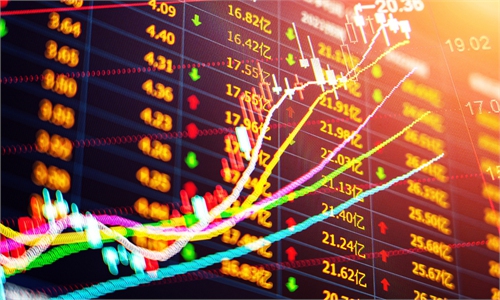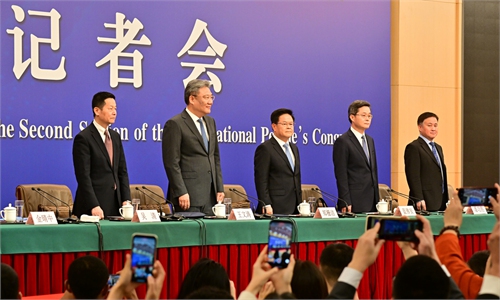Western financial institutions eye Chinese assets; efforts by US politicians to drive investment away from China failing: analysts
US' baseless crackdown served as advertisement for leading Chinese firms: analysts

Lujiazui Photo:VCG
A number of the world's leading financial investors have upped the ante in their Chinese asset portfolios this week, with Chinese analysts said on Thursday that the moves highlighted efforts by the US government attempting to drive global investment away from China is not what profit-pursuing companies want and is failing in its effects.
Paying no heed to some Western smear targeting the Chinese economy and Chinese enterprises and the "decoupling" efforts by US politicians, the latest announcement by US investment banks such as JPMorgan and CitiBank showed that they are increasing their holdings of a number of leading Chinese companies or advising their clients to do so.
JPMorgan Chase & Co's long position in shares of Chinese biomedicine company WuXi AppTec at the Hong Kong stock market has been increased to 10.31 percent from a previous reading of 9.88 percent, according to a filing document at the Hong Kong Stock Exchange on Wednesday.
The research arm of US-based CitiBank on Wednesday issued a research report indicating an upside 90-day catalyst watch for Chinese electric car maker BYD, with a target price for the company's shares at HK$463 ($59.19) and a "Buy" rating.
Both Chinese companies are competing in hotly contested emerging areas between China and the US that frequently appeared on lips of US politicians.
As a US Senate committee pushed a bill that could ban federal agencies from contracting from Chinese biotech companies, US trade association Biotechnology Innovation Organization said in a statement on Wednesday (US time) that it is taking steps to "separate" from Wuxi AppTec from its membership. Wuxi AppTec said the bill "relies on misleading allegations and inaccurate assertions," according to a Reuters report.
However, the actions by US financial institutions have served to underline the gap between market-oriented decisions by profit-pursuing companies and some US politicians' wishful thinking to shepherd foreign investment away from China, Chinese analysts noted on Thursday.
The ruthless and baseless crackdowns on a number of Chinese companies also served as an advertisement endorsing the leading status of these Chinese companies in respective fields, they noted.
Xi Junyang, a professor at the Shanghai University of Finance and Economics, told Global Times on Thursday that these developments showed that the US policies to suppress China face many limitations and have to a large extent failed.
The professor said that most of the companies from the EU and the US consider their financial operations and investments based on interests, rather than the politically motivated policies against China promoted by the US government.
"China has greater development space and offers more investment opportunities, so US investors are more likely to continue to place their bets in China and maintain the current positive trend," Xi noted.
The latest move by US investment banks followed recent inflow of a number of global asset management companies, including world's leading alternative asset managers Brookfield and KKR, expanding their investment portfolios in China, boosted by their growing confidence in Chinese assets.
The Western media have seized the readjustment across the Chinese stock market in January and hyped the risks of the Chinese capital market.
However, China's A-share market has since the Spring Festival holidays enjoyed a sustained rebound amid enhanced regulatory oversight and a raft of supportive measures by the authorities to ensure the high-quality development of the capital market and listed companies, recovering much of the lost ground during the short-term fluctuations.
Analysts noted that Western firms in fact did not pay much attention to the politically charged accusations by paranoid politicians that often occupy headlines in Western media outlets, as doing so will cost them dearly in terms of market opportunity. Companies, instead, tend to listen to professional consultants who offer non-biased judgment or gauge situation in China by their own efforts.
In the run-up to the US presidential election, political forces in the US have escalated their crackdown on Chinese products and Chinese companies and those in industry leading positions bear the brunt of the impact.
From cargo cranes and automobiles to garlic and the recent bill that could potentially ban TikTok in the US, a growing list of Chinese companies were among the targets US politicians have raised red flags against.
"US politicians launch stigmatization attacks on China's biomedical enterprises because these companies could shake up the US's monopoly in this industry," Wang Yiwei, director of the Institute of International Affairs at the Renmin University of China, told Global Times on Thursday.
"A part of US' hegemonic finance strategy is to focus on investing in the future strategic industries, and naturally anti-China politicians don't want people to invest in China's emerging industries," Wang said, noting that biomedical production is part of China's powerful new quality productive forces.
Wang said the US is counting on its allies to do its bidding and act in locked steps to stymie China's leading companies and development. He noted that the whole thing could have been preplanned ahead of the election run
The US has been implementing some long-arm jurisdiction practices or suppression to force international investors to leave China, which is contrary to market principles and may only show an effect in the short term, analysts said.




